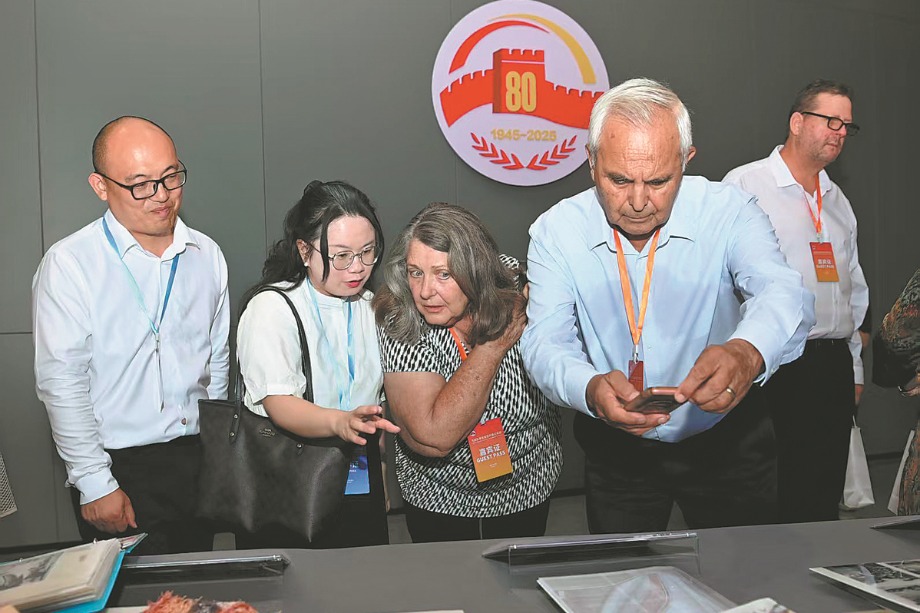Cooperation in the cold symbolizes shared future

Since China's inaugural Antarctic expedition in 1984, the nation has advanced from having nascent polar capabilities to making a significant global presence in the region.
Over the past four decades, Chinese polar scientists have cooperated with international peers, demonstrating that human society is a community with a shared future, rather than a zero-sum game, said Professor Ai Songtao, a 16-time polar explorer.
A notable example Ai provided was in December 2020, during the China-US trade war and the COVID-19 pandemic. At the time, China, Australia and the United States worked together in Antarctica to successfully rescue a sick Australian researcher.
"In Antarctica, human power is insignificant, and life is fragile, so we need to join hands to face nature's challenges and dangers. This rescue was a humanitarian effort," said Ai, who is also deputy director of the Chinese Antarctic Center of Surveying and Mapping at Wuhan University in Hubei province. "Although we now have helicopters, two icebreakers — including the domestically built Xuelong 2 — and various snow vehicles, proof of significant progress compared to the first Antarctic expedition 40 years ago, there are still difficulties in the face of nature."
During an Arctic expedition at the Yellow River Station, China's expedition team needed to set up equipment on a glacier, but the timing was poor as the snow had melted, making it impossible to use snow vehicles or any method to carry the equipment. Ai discussed the issue with other international researchers. German researchers, who would be stationed there during the spring when there was snow agreed to transport the equipment.
Initiated over casual conversation, this cooperation led to the successful equipment placement at an agreed-upon location, which the Chinese team saw when they returned to the Yellow River Station the following year.
"We felt immense joy and gratitude," Ai said. "In the polar regions, our international colleagues are truly willing to assist if you need help."
International cooperation is not only embodied in the mutual assistance offered among scientific research team members from different countries, but also in the ultimate scientific achievements realized by humanity.
Zhang Xiaohong, director of the Antarctic center of surveying and mapping, emphasized that Antarctica's size of 14 million square kilometers, equivalent to one-and-a-half times China's land area, cannot be fully explored and handled by a few hundred Chinese researchers there or the expedition team of any country. A comprehensive understanding of Antarctica's ecology and climate requires international collaboration.
For instance, data from multiple countries is needed if scientists want high-resolution, extensive maps of the Antarctic ice sheet and its underlying terrain, as well as the surrounding underwater topography, according to Zhang.
International collaboration also enhances satellite observations. For example, a country deploys satellites with a limited life span of five years, resulting in data gaps upon expiration. Meanwhile, satellites from other nations can ensure uninterrupted monitoring, offering more comprehensive insight into Antarctic transformations, Zhang said.
Speaking of the international landscape and global challenges in recent years, Ai emphasized the collaborative ethos prevalent in polar regions, where individuals unite to confront nature's obstacles collectively, fostering mutual gains and advancement. This cooperative spirit, centered on shared growth and development, stands in stark contrast to detrimental zero-sum games and strategies of decoupling.
"In the face of global issues such as climate change and rising sea levels, countries need to cooperate just as they do in Antarctica. Such cooperation benefits not only us, but all of humanity," Ai said, echoing Deng Xiaoping's 1984 inscription emphasizing contributions to the peaceful use of Antarctica for all humanity.
"While Antarctica may seem insignificant on the world stage, its spirit could act as a trailblazer, creating a blueprint for global cooperation and eventually sparking worldwide collaboration," he added.
lipeixuan@chinadaily.com.cn
- Sino-South Korean youth environmental program opens in Hainan
- Chinese and ASEAN experts call for more cooperation on maritime issues
- Court orders confiscation of former senior official's assets
- Intl forum on river-based civilizations attracts foreign and Chinese scholars, officials
- Chinese youth music festival makes overseas debut in Singapore
- Guangzhou airport records over 42% rise in entry-exit visits from ASEAN





































